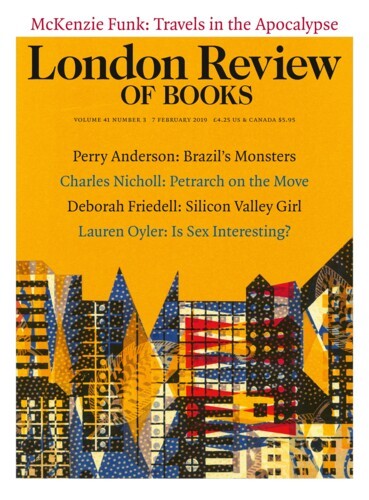At the end of the 1960s, just as the Troubles were starting, I learned to drive in a blue Volkswagen on the minor roads criss-crossing the Irish border, my father on tenterhooks in the passenger seat. Undignified by markings, these roads remain unlabelled and unnumbered on Google Maps. If they had names, they were for townlands, grand Plantation houses or abandoned highways: Bessmount, Mullaghmore, the Old Armagh Road. Visibility was poor and the verges treacherous. Tractors, often with trailers or muck-spreaders or a horse box, might block the road. Herds of cattle had to be chaperoned back to where they belonged, or set loose in no man’s land. There were potholes galore. The roads were inclined to flood because the water table was near the surface. It was poor rushy land, trapped between hills in the floodplain of the Blackwater River. Turloughs – small lakes – emerged after heavy rain.
It was ideal smuggling territory. Pig-smuggling. Cattle. Petrol. Small arms. Meeting a lorry, I would reverse to the nearest gap in the hedge and pull in, a tricky manoeuvre for a novice. My mother was a small-time smuggler. She had calculated the cost benefits for a family with five children living a hop, skip and jump from the North. We would fill up with petrol in Middletown, a village just over the border. It had a post office that doubled as a grocer’s shop and petrol station, and four pubs just beyond the checkpoints. The shop stocked Opal Fruits, Milky Bars and milk ice-lollies. Butter came in oblong pounds wrapped in greaseproof paper. My mother would secrete one under her armpit and another in the zippered compartment of her old handbag. Usually, the customs officer didn’t even stir from his hut. But once we were caught. My mother was mortified, taken into the little hut and given a warning; the butter, softening, was confiscated. The minibus held up behind our car belonged to the school where my father was vice principal and the senior football team bore gleeful witness to Mrs Rooney’s disgrace.
For a year or two I operated my own cross-border smuggling racket. Fireworks were banned in the South but you could buy them up north. I would cycle the 13 miles to Armagh and buy bangers, sparklers, whizz wheels, Brocks Bombshell Repeaters, Roman candles and a hard-to-smuggle thing called Mount Vesuvius. The trick was to remove the bike saddle and insert a polythene tube – the sort that posters came in – into the frame, which meant it could then be packed with quantities of fireworks without damaging them. I’d pack the saddle too. I was never stopped.
During the foot and mouth outbreak of 1967 we had to run the car over a ramp and into a trough of disinfectant and everyone had to get out and stand in an inch of what smelled like Jeyes Fluid. ‘Have you been on any farmland? Have you been near any cattle?’ By and large these measures succeeded in keeping foot and mouth out of the South.
As the Troubles hotted up, crossing the border became less folksy. The road was narrowed to a single lane; higher ramps were installed. There were notices, berms, watchtowers. These were then blown up, bullet-holed, graffitied. ‘Abandon hope all ye who enter here.’ ‘Up the Provos!’ ‘Come back soon.’ ‘Stiff Little Fingers’ – with ‘Fingers’ crossed out and ‘Provos’ in its place.
We had cousins in Keady, cousins near the Moy, family and ‘home places’ deep in Armagh’s drumlin landscape. The border put them and us in different countries. Coming back from visiting family, or returning from the beach at Bundoran, we cut through the North, through south Armagh and Crossmaglen or along Lower Lough Erne and through Enniskillen. The B-Specials often chose roads in the middle of nowhere to show whose side they were on. They would stop the car, suspicious of its Free State numberplate, put on alert by a statue of St Christopher bobbing on the dashboard. ‘And where are youse coming from at this time of night?’ My father unfolded the long, pea-green concertina of his Free State driving licence, its bits of Irish like an affront, under the Special’s torchlight. ‘I don’t know what language that is, Alistair, but it’s not English.’ The torch flashed into the back of the car, illuminating five sets of sunburned knees, lingering on my sister’s hot pants. ‘Anything in the boot?’ My father got out to open it. ‘On your way, Seamus.’ My father’s name was Peter.
The ramps eventually gave way to robots on dollies, trundling along like some gizmo from Mission Impossible, looking underneath the chassis for ‘suspicious objects’. If you attempted to ignore the checkpoint an automatically triggered chain of spikes wrecked all four tyres. This high-tech furniture was backed up by squaddies in fatigues and camouflage paint who watched from a hedge. We found it hard to distinguish between the soldiers’ accents. It was obvious they weren’t posh, but there were flashes of politeness. We weren’t taken in, thinking this a particularly across-the-water trait.
Later, helicopters turned this stretch of the Monaghan-Armagh border into a militarised zone. They flew over as I taught Julius Caesar in my old school. I associate the slow bits of the play with choppers flying into view – all eyes were on them, the class wrecked. Caesar as empire. The IRA as the conspirators. Sweet-talking Mark Antony like some Stormont mouthpiece urging peace and reconciliation.
Send Letters To:
The Editor
London Review of Books,
28 Little Russell Street
London, WC1A 2HN
letters@lrb.co.uk
Please include name, address, and a telephone number.

